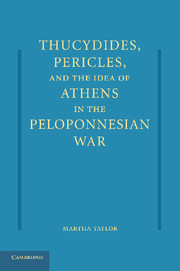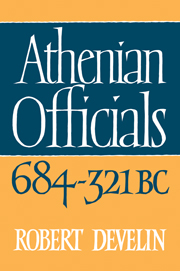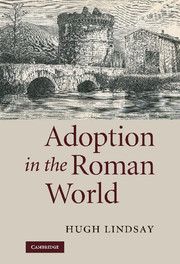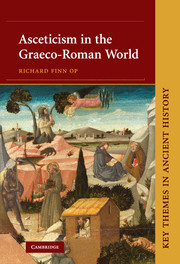Refine search
Actions for selected content:
23990 results in Ancient history
4 - The unequal treatment of states
-
- Book:
- War, Peace, and Alliance in Demosthenes' Athens
- Published online:
- 05 May 2010
- Print publication:
- 28 January 2010, pp 72-107
-
- Chapter
- Export citation
Abbreviations, translations, and inscriptions
-
- Book:
- War, Peace, and Alliance in Demosthenes' Athens
- Published online:
- 05 May 2010
- Print publication:
- 28 January 2010, pp xi-xiv
-
- Chapter
- Export citation
5 - Household metaphors
-
- Book:
- War, Peace, and Alliance in Demosthenes' Athens
- Published online:
- 05 May 2010
- Print publication:
- 28 January 2010, pp 108-133
-
- Chapter
- Export citation
Contents
-
- Book:
- War, Peace, and Alliance in Demosthenes' Athens
- Published online:
- 05 May 2010
- Print publication:
- 28 January 2010, pp vii-viii
-
- Chapter
- Export citation
8 - Reciprocity
-
- Book:
- War, Peace, and Alliance in Demosthenes' Athens
- Published online:
- 05 May 2010
- Print publication:
- 28 January 2010, pp 185-214
-
- Chapter
- Export citation
11 - Conclusion
-
- Book:
- War, Peace, and Alliance in Demosthenes' Athens
- Published online:
- 05 May 2010
- Print publication:
- 28 January 2010, pp 265-269
-
- Chapter
- Export citation
Appendix 2 - Plato and Aristotle on the causes of war
-
- Book:
- War, Peace, and Alliance in Demosthenes' Athens
- Published online:
- 05 May 2010
- Print publication:
- 28 January 2010, pp 276-278
-
- Chapter
- Export citation
Appendix 1 - Speeches and texts
-
- Book:
- War, Peace, and Alliance in Demosthenes' Athens
- Published online:
- 05 May 2010
- Print publication:
- 28 January 2010, pp 270-275
-
- Chapter
- Export citation
9 - Legalism
-
- Book:
- War, Peace, and Alliance in Demosthenes' Athens
- Published online:
- 05 May 2010
- Print publication:
- 28 January 2010, pp 215-236
-
- Chapter
- Export citation
Frontmatter
-
- Book:
- War, Peace, and Alliance in Demosthenes' Athens
- Published online:
- 05 May 2010
- Print publication:
- 28 January 2010, pp i-vi
-
- Chapter
- Export citation
6 - Defense and attack
-
- Book:
- War, Peace, and Alliance in Demosthenes' Athens
- Published online:
- 05 May 2010
- Print publication:
- 28 January 2010, pp 134-153
-
- Chapter
- Export citation
Acknowledgments
-
- Book:
- War, Peace, and Alliance in Demosthenes' Athens
- Published online:
- 05 May 2010
- Print publication:
- 28 January 2010, pp ix-x
-
- Chapter
- Export citation
Index
-
- Book:
- War, Peace, and Alliance in Demosthenes' Athens
- Published online:
- 05 May 2010
- Print publication:
- 28 January 2010, pp 309-317
-
- Chapter
- Export citation

Thucydides, Pericles, and the Idea of Athens in the Peloponnesian War
-
- Published online:
- 27 January 2010
- Print publication:
- 26 October 2009

Athenian Officials 684–321 BC
-
- Published online:
- 26 January 2010
- Print publication:
- 25 August 1989

Adoption in the Roman World
-
- Published online:
- 25 January 2010
- Print publication:
- 29 October 2009

Asceticism in the Graeco-Roman World
-
- Published online:
- 22 January 2010
- Print publication:
- 02 July 2009
5 - The faces of eloquence: the Dialogus de oratoribus
- from Part II - Texts
-
-
- Book:
- The Cambridge Companion to Tacitus
- Published online:
- 28 March 2010
- Print publication:
- 21 January 2010, pp 73-84
-
- Chapter
- Export citation
2 - Illyricum in Roman foreign affairs: historical outline, theoretical approaches and geography
-
- Book:
- Illyricum in Roman Politics, 229 BC–AD 68
- Published online:
- 05 May 2010
- Print publication:
- 21 January 2010, pp 18-43
-
- Chapter
- Export citation
9 - Iulio-Claudians in Illyricum: the tale of two provinces
-
- Book:
- Illyricum in Roman Politics, 229 BC–AD 68
- Published online:
- 05 May 2010
- Print publication:
- 21 January 2010, pp 156-176
-
- Chapter
- Export citation
